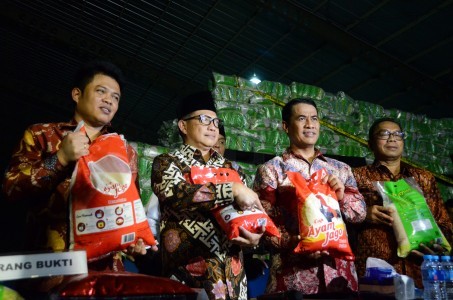Popular Reads
Top Results
Can't find what you're looking for?
View all search resultsPopular Reads
Top Results
Can't find what you're looking for?
View all search resultsOmbudsman probes raid on rice warehouse
Change text size
Gift Premium Articles
to Anyone
 Business Competition Supervisory Commission (KPPU) chairman Syarkawi Rauf (left), National Police chief Gen. Tito Karnavian (second left), Agriculture Minister Andi Amran Sulaiman (second right) and Trade Ministry secretary-general Karyanto hold packets of rice seized from a warehouse in Bekasi, West Java owned by PT Indo Beras Unggul (IBU) on July 20. (Antara/Risky Andrianto)
Business Competition Supervisory Commission (KPPU) chairman Syarkawi Rauf (left), National Police chief Gen. Tito Karnavian (second left), Agriculture Minister Andi Amran Sulaiman (second right) and Trade Ministry secretary-general Karyanto hold packets of rice seized from a warehouse in Bekasi, West Java owned by PT Indo Beras Unggul (IBU) on July 20. (Antara/Risky Andrianto)
T
he Indonesian Ombudsman has criticized a raid by the Food Task Force on a rice warehouse in Bekasi, West Java, last week, owned by PT Indo Beras Unggul (IBU), which was accused selling low quality rice as premium rice.
Ombudsman commissioner Alamsyah Saragih said on Thursday that the institution would look into the matter.
“Don’t use the task force to build an image. The task force was established to improve the [staple food] distribution chain,” said Alamsyah, as reported by tribunnews.com.
Read also: Firm denies any wrongdoing in premium rice scandalOn Thursday, the Indonesian Ombudsman summoned the National Police's Criminal Investigation Department (Bareskrim) and special economic crimes department to seek clarification about the raid.
Members of the Food Task Force consist of representatives of the Agriculture Ministry, the Trade Ministry, the National Police and the Business Competition Supervisory Commission (KPPU).
After the raid, Bareskrim economic crimes chief Brig. Gen. Agung Setya claimed that PT IBU had bought unhusked rice from farmers for Rp 4,900 per kilogram and sold it as medium and premium rice for Rp 13,700 and Rp 20,400 per kilogram, respectively.
PT IBU spokesman Jo Tjong Seng said the government subsidized farmers so that they could increase their productivity, while his company bought rice from any farmer whether they were subsidized or not.
Alamsyah said his office was looking into whether there were instances of invalid information that led to misleading measures, whether the relevant institutions had done their job in carrying out supervision and the process of regulation making. (bbn)









